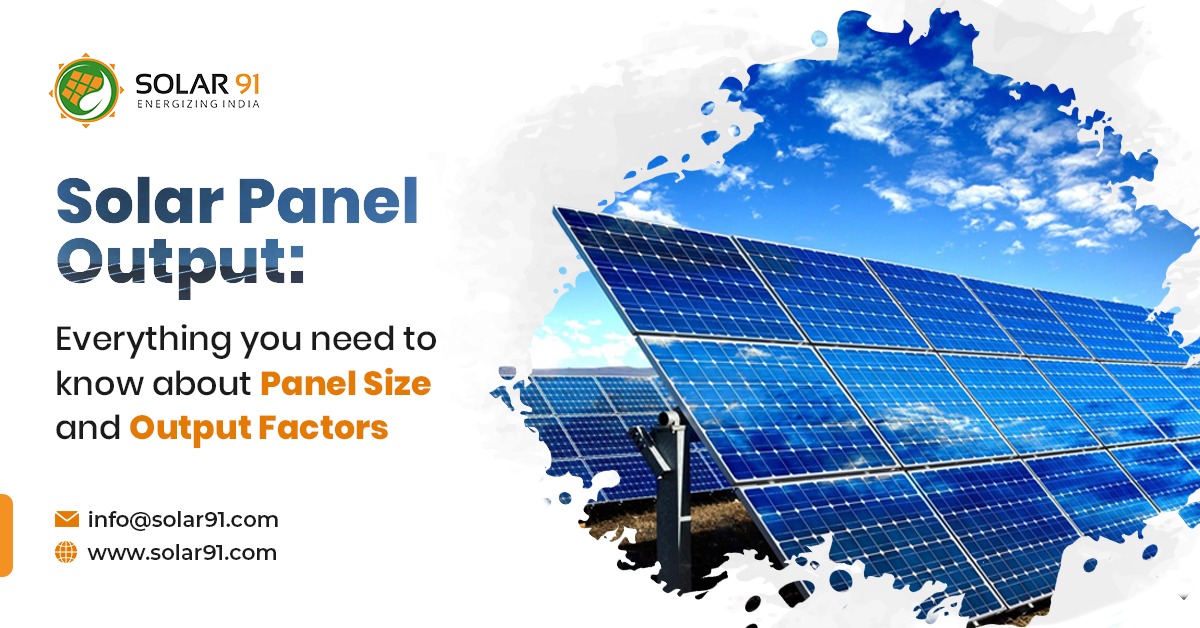Solar Panel Output: Everything you need to know about Panel Size and Output Factors
Solar energy is the future of the world, the environment is suffering, and so are we. Humans have just been on Earth for less than a percent of the time of Earth’s total existence, and in much less time, we have caused more harm to it than the damage it previously had. The reason for such a bad condition is the use of natural resources to generate energy and feel like there is no tomorrow. We aren’t thinking about the upcoming generations. The cost of heavy electricity bills is a huge burden for people, the costs are so high only because we use nonrenewable sources to generate electricity.
To get rid of these heavy electricity bills and the harm to the environment, Solar energy is the best way. Solar setups catch the abundant sunlight falling onto the roof of your place and convert it into electricity, and surely, there is nothing better than that. The Solar energy setups cost way lesser than the subsequent returns that you get in the form of negligible electricity bills and cleaner energy. Studies indicate that Solar setups yield a return of double the investment in a decade, the solar setups have a long life and a very low maintenance cost. The weekly maintenance task of Solar panels only includes cleaning the panels for the accumulated dust.
There are a lot of questions that come into mind when installing solar panels, the most prominent of these questions are what is the perfect size of solar panels and what are the factors that affect the output of Solar panels, well, in this article, we will solve all of these questions and without wasting any time, let’s jump straight in!!
How to Find the Perfect Solar Panel size?
To find the perfect size for the solar panel, there are certain important factors you need to consider, solar panels and solar setups are one-time investments that yield high returns for long years, you don’t need to hesitate while investing. The factors that affect the requirement of Solar panels are:
Your monthly electricity consumption
The monthly electricity consumption is a huge factor affecting your choice of size for the solar panels. You need to look at your previous bills analyze the monthly consumption. You can calculate the monthly consumption by adding the total consumption of 12 months and then dividing it by 12. You also need to consider natural factors such as weather. In summers, the consumption is more, but the sunlight is also available for a longer time, so if you live in an area where the climate is generally hotter like a tropical country, then you can reduce the number of panels you get installed since the sunlight is available for a longer time.
What can you afford?
Budget can influence your choice for solar panels, the panels generally used in households are photovoltaic solar panels, which are less efficient and have a lesser output. The more expensive ones are the mono PERC panels which have a higher output. If you can afford mono PERC panels then you can surely cut on the panel size and save a bit of space.
Hours of Sunlight
The availability of sunlight has a direct impact on the size to choose, if sunlight is available for more than 12 hours a day, you can reduce the size of your solar setup up to a great extent.
The most commonly used solar panels are the 60 cell photovoltaic panels which generate a 270-watt output under favorable conditions. Now that you can make a better decision about the size of your solar panels, let us know about the factors that affect the output of solar panels.
Factors affecting the output of solar panels
There are many factors that affect the output of solar panels, the most important of these factors are:
Position of panels
For the best output, the solar setup should be situated at a place where there is unrestricted availability of sunlight, there should be no tall structure like a tree or building nearby that can cast a shadow upon the panels hence drastically reducing the output.
Intensity of Sunlight
If you live in an area where there is sufficient sunlight but due to factors such as smog and clouds the intensity of sunlight is often lesser than it should be, then it is problem. Sunlight should fall unfiltered on the solar panels for best outputs.
Maintenance of Panels
Solar panels don’t need a lot of maintenance, once a week, you should clean the panels for dust that accumulates on them. The accumulated dust hampers the output.
Age of panels
The age of panels affects the efficiency of solar panels, with years, the cells of solar panels start degrading. It is not a thing to worry about, the life cycle of solar panels is long enough to yield you a good ROI.
Conclusion
Solar panels are great for the environment and your pockets as well, you need to have basic knowledge about the maintenance and the size of solar panels before getting them installed. We at Solar91 ensure complete transparency during the installation process, the experts here take their time in explaining you the important aspects of solar panels.

